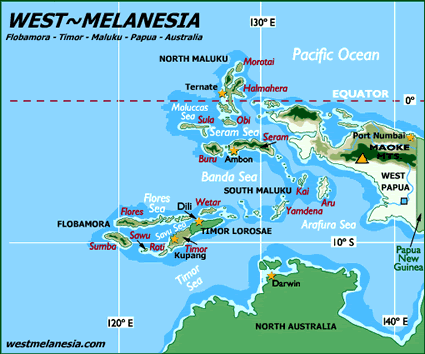The Tabaru people live in the area of West Halmahera Regency, North Maluku Province, in the northern Maluku Islands of Indonesia.
Their language, called Tabaru, belongs to the North Halmahera branch of the non-Austronesian (West Papuan) family and has been documented in villages across Halmahera.
According to local histories, the Tabaru trace their origins to early Alifuru-speaking peoples who migrated into the island's upland and lowland zones perhaps two thousand years ago, and over time, some groups settled in high-ridge ("nyeku") zones and others in the lowland ("adu") plains, giving rise to local internal distinctions.
Members of the Tabaru people live in both upland and lowland villages within Halmahera's forest-and-coast landscape.
They sustain themselves through traditional agriculture—such as cultivation of sago, root crops, and plantation crops like nutmeg and clove—and through forest gathering and coastal fishing, drawing on ancestral knowledge of local ecosystems.
Their customary social life remains tied to indigenous norms of community, kinship, and land-use. For instance, the institution of sasi (a customary resource-management vow) still governs certain harvests and communal rights in plantation zones.
At the same time, they are integrating more fully into regional Indonesian life. Younger generations use Bahasa Indonesia and regional Malay varieties, schooling and migration are influencing village stability, and external pressures such as mining or plantation development are reshaping land use.
The Tabaru people's religious life is a blend of indigenous customary beliefs and the major religions of Indonesia. Traditional practices include sacred oaths and the stewardship of forest and plantation resources under spiritual-social norms, reflecting a worldview that links community, land, and ritual observance.
Over the years, the Tabaru have been influenced by the presence of Islamic and Christian missionaries in Maluku, and many community members identify with one of these world religions, while often retaining customary values and local ritual practices alongside formal religion.
Cultural-linguistic preservation is a crucial need for the Tabaru people, as their native language remains the basis for identity and heritage but faces competition from Bahasa Indonesia and regional Malay in schooling and public life. Effective livelihood strategies that honor the Tabaru people's traditional relationship with forest, plantation, and coastal resources would help them maintain economic stability without forced cultural change. Educational programs that incorporate the Tabaru language and worldview alongside Indonesian curricula would strengthen youth engagement with their heritage while equipping them for broader opportunities. Secure recognition of customary land and forest rights—especially in the face of external resource exploitation—would safeguard the Tabaru community's autonomy and ecological base.
Pray that the Tabaru language would be valued, recorded, and passed on, so that the community's distinct heritage remains alive.
Pray for sustainable livelihood pathways for the Tabaru people that honor their traditional knowledge of forest, plantation, and coastal environments.
Pray for clarity and recognition of the Tabaru people's customary land, forest, and coastal rights, protecting them from displacement or resource loss.
Pray for Christian workers and local believers to engage sensitively among the Tabaru, and for the emergence of indigenous church leaders and discipleship in the Tabaru language.
Scripture Prayers for the Tabaru in Indonesia.
SU KU TABARU – Sejarah Suku Tabaru. Gesit Halbar.
gesithalbar.id
"Afiks derivasi dalam Bahasa Inggris dan Bahasa Tabaru." Jurnal E-Journal Unsrat.
ejournal.unsrat.ac.id
"Tabaru traditional community … conservation ethics." IJCS, 2022.
"Tabaru language." Wikipedia.
| Profile Source: Joshua Project |











